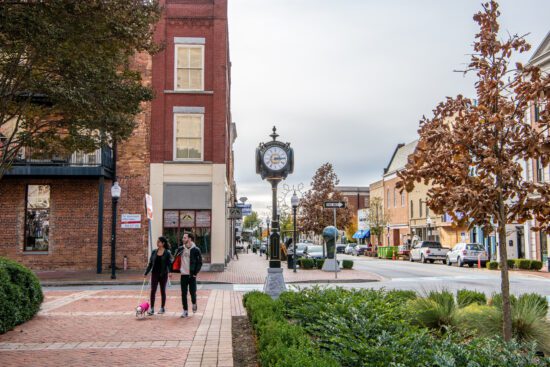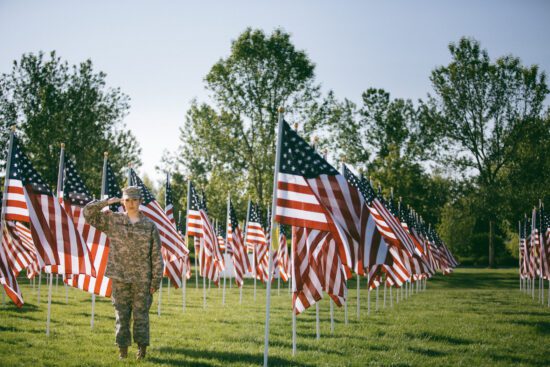Abuse has, tragically, been a part of the story of more people than we dared imagine. And the devastating truth is that much of this abuse has happened within the church, by those who proclaim God’s name.
Jenn Greenberg is one of those stories. She was abused by her church-going father. Yet she has retained her faith. She has recently written a courageous, compelling book that reflects on how God brought life and hope in the darkest of situations. Greenberg shows how the gospel enables survivors to navigate issues of guilt, forgiveness, love, and value. And she challenges church leaders to protect the vulnerable among their congregations.
In light of the Caring Well Challenge, our partner, The Good Book Company, is offering an exclusive free chapter download from Not Forsaken, Greenberg’s story of life after abuse, with a foreward by Russell Moore. Download chapter two of Not Forsaken, which includes some of the telltale signs of an abuser, their character traits and behaviors, and how to spot them in your church.
Download here.
Questions for an abuse survivor
Greenberg answers a few questions below about the challenges she’s faced, the hope she has in the gospel, and the desire she has for those who are abuse survivors.
Jenn, your upcoming book tells your story of life after abuse. Could you share briefly about how you came to write the book?
I’d been wanting to write a book for a very long time. My mom encouraged me to write off and on for probably a decade. But really, I think I was still processing so much of what I’d been through, and there were a number of relationships I was working to salvage that I feared would be made more tenuous if I went public with my story. For that matter, I was still trying to figure out exactly what had happened to me.
Having grown up with abuse, abuse was my normal. So sorting out what events were inappropriate or even criminal, and which were more common issues every family dealt with, took a lot of time, maturity, and growth for me. Getting married to a godly man was a major factor in that. I slowly acclimated to being treated in a loving, honorable, and thoughtful manner, and as that became my new normal, I was able to look back at my old normal and realize how abnormal and wrong it had been. But until some distance and objectivity was achieved, I found it very difficult to communicate, let alone write about my experiences.
What has been most instrumental in your healing?
I’d have to say my husband has been the most instrumental person. He’s helped me figure out how to cope with and manage PTSD and the fallout of trauma, including depression, anxiety, distrustfulness, and panic attacks. He never made me feel foolish or damaged. In fact, one of the things he always told me was, “You’re depressed because you’ve had a depressing life,” or “You’re anxious because you’re used to expecting betrayal and stressful behavior from others.” So, he always made me feel acknowledged and reasonable, where my tendency was to feel stupid and crazy, because that’s how my abuser had always made me feel whenever I complained or cried.
And of course, the other thing my husband did for me was to tell my dad to stay away from me and never talk to me again. Our marriage is probably a very extreme example of what it means to “leave and cleave.” I left my dad’s house, and Jason cut off that poisonous relationship for me. He’s also managed a lot of difficult communications and served as a mediator in relationships that—maybe weren’t abusive per se—but were very high-stress because of the damage my dad’s abuse had done in our lives.
How might abuse that is in the church affect a survivor differently than abuse outside the church?
Abuse in the church, or really any kind of spiritual abuse, specifically affects our relationship with Jesus Christ. That’s why it’s so dangerous. Its consequences can span out of this world and into the next. For example, I may have a completely shattered home life, yet still find comfort in corporate worship or personal prayer time, because God is my shelter in the storm. The church should be a sanctuary—a safe haven—from this broken, sin-riddled world. But when that haven is infiltrated by an abuser, or our understanding of the Bible and God is warped and corrupted by heresy and bad theology, the church may no longer be a safe place, and God may no longer feel like a refuge even though he really is.
If we’re being taught dangerous doctrines, such as, “Women aren’t created in the image of God,” or, “Jesus won’t forgive you if you don’t forgive and forget,” and, “Turn the other cheek to the person who won’t stop beating you up,” those lies and twistings of Scripture can drive a wedge between us and Christ. They can have eternal, spiritual consequences, both for the victim and for the abuser. This is a classic millstone-around-your-neck situation. We do not want to be the person who causes “one of these little ones to stumble” (Luke 17:2). I firmly believe that no human being, and not even Satan himself, can stop God from saving someone. But being the person or church who impedes that process should really be a terrifying prospect to us, and one we’re eager to avoid.
How can churches cultivate an environment that is safe for survivors to seek help?
A solid, biblical teaching of repentance is a good place to start. That may seem counterintuitive, but we need to understand what genuine repentance looks like, as opposed to the false repentance, lies, or excuses abusers so often spout. A genuinely repentant person will be willing to get counseling. They’ll be willing to make drastic changes in their lives and will fight hard against their sinful inclinations. They’ll talk to a pastor. They’ll want the church, their friends, and yes, even the law, to hold them accountable. They will humbly and eagerly make whatever amends they can. They will never demand forgiveness or shift blame onto someone or something else. In fact, like the thief on the cross, they will accept the consequences of their sins in this life.
Unrepentant abusers are not like that. They want to cover up, hide, break you down, shut you up, shame you into silence, and shift the blame off themselves. It’s the old, “If you hadn’t spent so much money at the grocery store, I wouldn’t have hit you,” or, “If traffic hadn’t been so bad on the way home from work, I wouldn’t have gotten drunk.” Those are not apologies, those are excuses, and lies.
When pastors, congregations, and victims have a healthy understanding of what repentance looks like, they’ll be better able to identify an abuser and react accordingly. If victims understand that their church leadership has a high view of authentic repentance, they will feel more confident seeking help. They’ll be assured that their pastor will understand the ongoing pattern of sin oppressing them as dysfunctional, unbiblical, and concerning. So, whenever and however you preach about repentance, you’re telling victims what you will expect of their abuser.
What are some things Christians have done or said that have been hurtful?
Well, the worst thing anyone ever said to me was when this person compared me to Potiphar’s wife. She was the woman who tried to seduce Joseph in Genesis 39, and when he resisted her, she assaulted him and falsely accused him of rape. So, that was an incredibly hurtful thing for someone to imply, particularly because my abuse happened during childhood. I never tried to seduce anyone, and my dad was far from a godly man like Joseph.
That’s an extreme example, but any kind of questioning of the victim’s integrity, modesty, or intelligence is really hurtful. We want to avoid responses like, “What were you wearing?” “How much did you drink?” “Why were you even at that party?” Questions like this are just not helpful. And of course, the other hurtful thing people did was to try to hush me, advise me to “get over it,” say things like, “the past is the past,” and basically show a lack of concern or understanding for how grief works. Thankfully, I don’t think that will be an issue for many of your readers, as they probably wouldn’t be reading this interview if they didn’t care.
On the other hand, what are the things they have done and said that have been helpful?
I told a woman at our church about how I’d been compared to Potiphar’s wife and how I was really upset about it, and her response was the nicest thing anyone has ever said to me. She said, “Jennifer, you’re not like Potiphar’s wife, you’re like Paul.” That response just left me speechless with gratitude, and I was humbled anyone could think so highly of me.
We know from his letters that Paul was beaten, falsely accused, held captive, berated, bullied; the list goes on and on. He was treated heinously, yet God maintained his faith through it all, and in gratitude, Paul boasted in the glory and grace of Jesus Christ for sustaining him through his suffering. So, having that reassurance from friends and loved ones—that our victimization is not our fault, and no sign of a weak faith or of God’s disfavor—is monumental to the recovery process. It shifts our perspective from works and legalism to grace and love. We need to be very clear that our abuser’s sin is not our fault, that we are not defined by our pain or our past, and we have absolutely nothing to be ashamed of because Jesus Christ has made us pure.
How might the church care for a male survivor differently than a female survivor?
You know, I’d honestly encourage them not to. I’ve spoken to many male survivors, and one of the reasons they stay quiet is because they feel like they won’t be believed or sympathized with as much as a woman would. So, I think we need to make a special effort to treat male survivors with the same love and mercy we’d extend to a female. After all, Abel, David, Jonathan, Joseph, Paul, and even Jesus, were males who suffered abuse. So, male survivors, from a biblical perspective, are not oddities, or weak, or dishonorable at all. In fact, I hope that’s an encouragement to any males survivors reading this; you will find relatable stories written all over the pages of Scripture, and God himself can relate with your suffering.
One thing I do try to do, anytime a survivor confides in me, is thank them for their trust. It’s a really difficult thing to put your pain into words. But to share those words with another—that confidence is pretty much the biggest compliment anyone can ever give you. So, appreciate it. Be grateful for it. Express that you understand that talking to you wasn’t an easy or pleasant decision.
I guess I could add, particularly for male survivors, but also for females, is don’t pressure them to seek counseling right off the bat. Sometimes that first hurdle of telling someone, anyone, is emotionally exhausting, and insisting on counseling or therapy right away may overwhelm him or her. You can suggest it or ask if they want it, of course, but if they’re not ready, don’t push it. Unless someone is in danger, there’s no rush. In fact, being patient and not rushing things can help them progress to that next step faster.
What are a few resources you’d recommend to a friend or a spouse of a survivor that wants to grow in awareness and understanding to better care for their loved one?
Well, at the risk of sounding self-promoting, this is exactly why I wrote Not Forsaken. I began writing my book as a series of personal letters to my husband to help him understand what I was going through, what happened to me, and why I am the way that I am. Those letters sort of evolved into chapters. I started excavating my memories and emotions and undergoing a lot of self-discovery, and that’s when I realized I was writing a book that other people might read and find helpful. Jason was never abused, so, while he’s always been incredibly supportive, sympathetic, and protective, I had a deep need to communicate my pain to my husband and help him know the grieving I was experiencing.
One of my hopes and prayers for Not Forsaken is that it will help spouses, friends, pastors, and counsellors, understand on a deeper more personal level what survivors go through. As far as other resources, I’m at a bit of a disadvantage. For the past few years I’ve actually avoided reading other people’s books about abuse recovery because I didn’t want them to color my own story or influence the memories of how I felt back then.
Sarah Walton and Kristen Wetherell have a book, also put out by my publisher called Hope When It Hurts. It’s not specifically about abuse recovery, but it’s about maintaining faith and hope in God through difficult circumstances. David Murray also has a lot of helpful resources, including the book Christians Get Depressed Too, and of course his blog, HeadHeartHand, which frequently covers issues such as forgiveness, anxiety, and sin in ways that I think are very helpful and edifying for abuse survivors.
Many survivors struggle with church, and some even struggle with faith as a result of the abuse they endured. What has helped you remain in the church after abuse?
God. Really, it’s all God. I wrote a song, during the early stages of my recovery, and the lyrics begin, “I have been whittled down to a spider’s thread.” And I really felt that. I felt like just one more disappointment, one more broken trust, one more ignorant comment, would destroy me on a spiritual level. However, God is faithful, and he faithfully did CPR on my soul a multitude of times.
One thing I would encourage any survivor to do is to view the church of God as a body beyond their individual congregation or denomination. If you’ve experienced abuse or negligence in your individual church, and the memories and grief from that are inhibiting your ability to relax and worship, it’s OK to seek out another congregation where maybe you aren’t suffocated by past hurts. Sometimes it’s very hard to trust the sermons of a pastor who’s given you unbiblical or harmful counsel. It can be hard to sit next to someone in the pew who previously disbelieved you or disregarded you. You know, people are people everywhere, and no matter what church you attend, you’ll be a sinner surrounded by sinners. However, creating some space between the people who have hurt us in the past—whether intentionally or accidentally—can give us room to emotionally exhale and worship Jesus again with other believers. I think that’s very important. We can’t allow sinful people to get between us and God.
What hope and encouragement might you give a fellow survivor reading this interview?
I’d say, this world is not our home. You know, so often I longed desperately for a dad who loved me and a family that was whole. I yearned for a pastor and a church who understood me and accepted me as Jesus Christ did. The truth is, our home is Heaven. Our Father is God Almighty. Our brother is Jesus. Our family is the true, real, genuine, spiritual Church. Our disappointment in our abusers is justified, as is our anger, grief, and distress. But in time, when we’re able to anchor our hopes entirely on something better, Someone higher, that’s when we start feeling joy again. We’ve got to get away from sin and wicked people who Psalm 1 says are dust on the wind.
No matter how bad things get, no matter what situation we’ve come out of, no matter what dark evils cast shadows from our past, Jesus Christ is faithful to us. He is our Wonderful Counselor who always understands, our Mighty God who is powerful to save, our Everlasting Father who will never abandon or betray us, and our Prince of Peace who is preparing a home for us in Heaven (Isa. 9:6; John 14:3). Do not let this passing evil age trick you into thinking it’s all that there is. The fact that you’ve made it this far, and survived so much, is proof that God loves you, and is actively sustaining you despite the wickedness of others.










